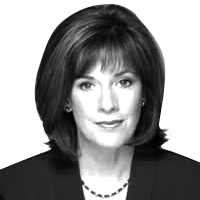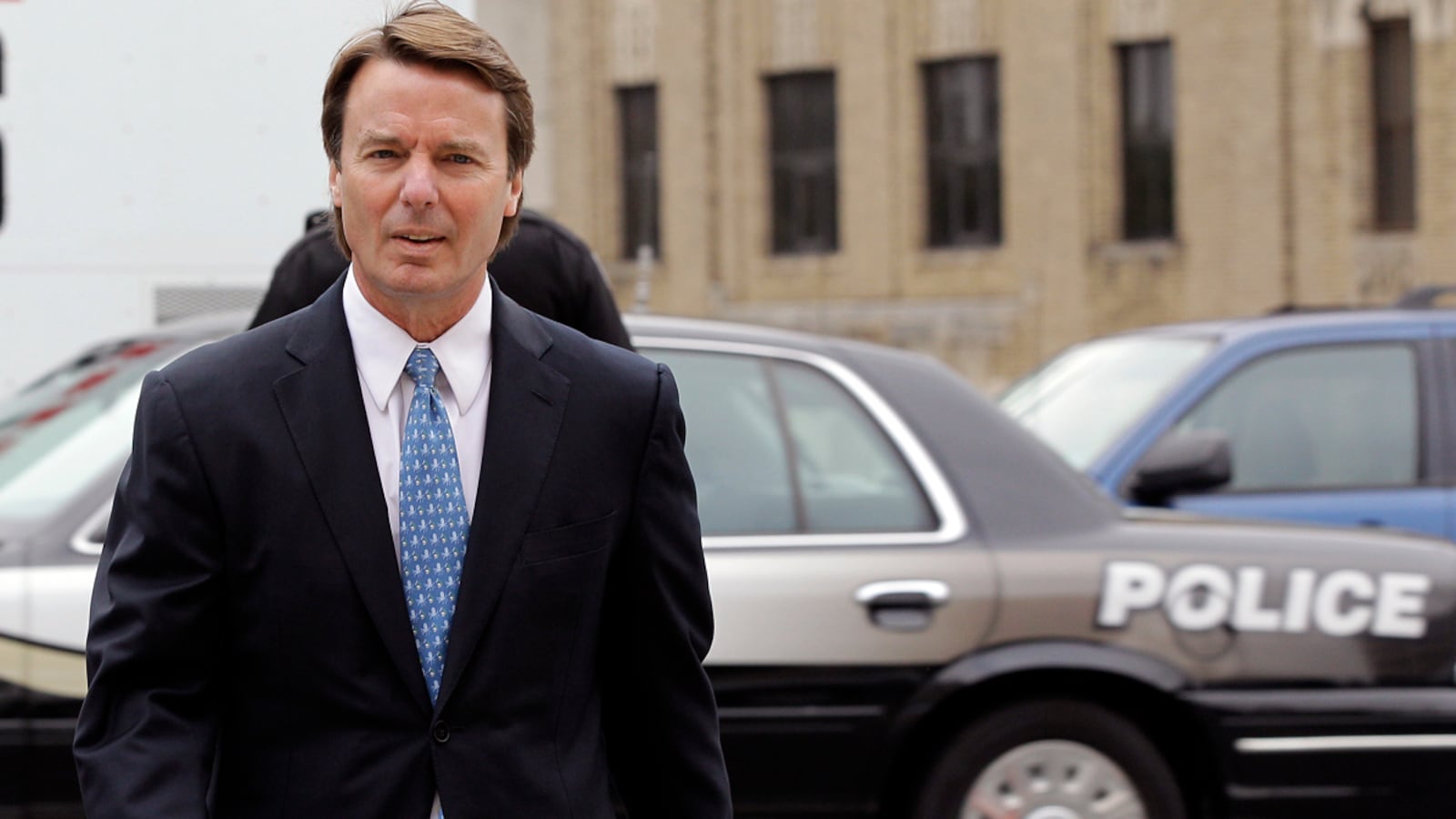Wendy Button was a highly regarded political speech writer in 2003 when then-Senator John Edwards came knocking on her door.
The Bennington-educated Button had already worked as a speechwriter for the mayor of Boston and was currently on the staff of Senator Hillary Rodham Clinton. But the prospect of working for a presidential candidate—especially someone who shared her core values—intrigued Button. She was offered the job of chief speechwriter for Edwards, and became the first woman in the Democratic Party to hold that job. She was just 34 years old.
When Button took the stand at Edwards's campaign-finance corruption trial on Tuesday, one was immediately struck by her tiny size and quiet voice. Dressed in a simple black skirt, beige cardigan, and small wire-rimmed eyeglasses, she climbed into the witness box and began to talk about the man she calls, simply, John.
She recited her history with Edwards, which included writing his two concession speeches after the 2004 and 2008 presidential primaries. But Button’s most riveting testimony came as she explained the very last thing she ever wrote for the senator. The time period in question began in July 2009. This was after Edwards’s second failed attempt at running for president, after the National Enquirer had thoroughly revealed his illicit affair with campaign videographer Rielle Hunter, and more than a year after the American public had heard Edwards lie to ABC News correspondent Bob Woodruff. When all the facts were known, Edwards’s statements to ABC about not being the father of Hunter’s baby and not knowing anything about the money his billionaire supporter Fred Baron had paid out to hide his secret were highly suspect. And in the summer of 2009, the media was already crackling over the highly anticipated tell-all book, The Politician, soon to be released by former Edwards aide Andrew Young.

When Button heard about the book’s pending release she took it upon herself to email her former employer and send him a draft statement he might consider releasing to finally come clean.
“Friends reach out to friends when times are tough,” Button explained to the court in her gentle tone. “I sent him an email and said, 'If you wanted, this would be a good time to say something.'” Attached was a proposed statement that would have Edwards admit paternity and apologize to both Fred Baron and Andrew Young for involving them so deeply in his messy extramarital affair and coverup.
As the pair worked to craft an acceptable statement over the next six weeks there were countless phone calls, Button told the jury, during which John Edwards admitted startling things to her. Asked about those conversations by prosecutor Robert Higdon, Button repeatedly referred to government exhibit #475, a battered, bright green notebook she kept in 2009. It had been confiscated as evidence in this federal trial. Among Button’s revelations:
• Edwards admitted he “had always known” Hunter’s daughter was his. He agreed that since he had publicly rejected little Frances Quinn he should publicly embrace her by putting it on the record that she was not a mistake—it was he who had made the mistake.
• Edwards said “he knew all along that Fred was taking care of things but didn’t know all the (financial) details.”
• He firmly rejected apologizing to Andrew Young, explaining that he considered Young to be “a bad guy.”
• When asked by Button about the legality of using other people's money to hide his mistress, Edwards said since he was a private citizen and all gift taxes had been paid it was legal.
• While Edwards was in favor of coming clean to the public, his wife, Elizabeth, was not.
• Edwards said he had “only just recently learned that (billionaire) Bunny Melon had been contributing before Fred … and that the money had gone to Andrew Young.”
Button testified that she wrote about a half-dozen drafts of a "come clean" statement, adding and subtracting sentences as they went. In the beginning, the statement was short. Edwards later wanted it made longer so he could announce he was opening up a law firm for the poor and a foundation to fight poverty. Button said she gently pushed him to address other aspects of his highly publicized scandal such as reports that he and Hunter had made a steamy sex tape, but Edwards resisted.
Button recalled that about a month into the process Edwards was satisfied enough that he passed around the long version of the statement to about a dozen close associates for feedback. Included in that version was Button’s line: “I never asked Mr. Baron for a dime. (But) I stood by and watched him support Quinn. I will pay him back.”
After the feedback came in from Edwards’s confidants the statement was trimmed again so that it focused mostly on the paternity issue. The money line, as Button called it—referring to Fred Baron’s seemingly never-ending largesse in helping not only Hunter but the Young family remain in hiding—had morphed from its original “I knew other people were supporting Quinn…” to, “I knew other people—without my knowledge—were supporting Quinn…"
“I struggled with taking out the (original) Fred line,” Button testified.
“This disturbed you,” asked prosecutor Higdon.
“Yes, this was a statement that was supposed to tell the truth,” she said emphatically.
“Why were you concerned?” Higdon prodded.
“I knew it wasn’t true,” Button replied, adding that she had been “deeply” disturbed by the event.
The exchange made some court watchers speculate that the jury might be wondering why it would take someone so long—why so much verbal massaging would be necessary—to simply stand up and tell the truth. Button resumes her direct examination tomorrow.
Earlier in the day, witness number 16, Tim Toben, endured a cross examination that was withering at times. Toben was Andrew Young’s neighbor and confidant during the time the Youngs and Hunter took to the road to hide in late December 2007. On Monday, Toben had described to the jury how he had driven the group to a private jetport at 4 a.m. shortly before Christmas of that year—the beginning of their globe-trotting odyssey. He testified that he had also stayed in touch with the nomads, performing favors for them back home in North Carolina during their travels.
On Tuesday, defense attorney Allison Van Laningham pounced, attempting to impeach Toben’s credibility with a fistful of emails Toben and Young had exchanged as the scandal wore on. She accused Toben of being hostile and bitter toward Edwards.
“There were times over the years I probably used some hostile language. But I don’t feel any hostility today,” the senator's former supporter said in a measured tone. “I just felt disappointed … and let down.”
In their email exchanges Toben and Young mocked John Edwards and variously called him a “skeeze,” a “sick and evil bastard,” a "pathetic little man,” and “an asshole.” As Toben was handed about 20 separate emails he sometimes shook his head and pursed his lips in tight resignation as he quietly read them to himself. On one occasion Toben’s upper cheeks turned ruddy red over his full dark beard.
“Did you call Elizabeth Edwards a bitch?” Van Laningham asked as the jury read his email on a big screen displayed before them.
“I am embarrassed to say, yes,” Toben said quietly.
The jury had already heard Toben recount a dinner he’d had in June 2008 with John Edwards during which he said the failed presidential candidate had discussed how, despite his tawdry public affair, he might still be President Obama’s choice for vice president or attorney general.
“How long before the Obama campaign was contacted?” asked Van Langingham.
“I called them on the way home from dinner that night,” Toben admitted, and said he had a friend working in the Obama campaign. “I was alarmed. I couldn’t believe that a man with a four-month-old baby from another woman was thinking he could be vice president.”
“You told the Obama campaign they should pay attention to the National Enquirer,” the defense attorney asked.
The witness agreed he had spoken to his friend Steve Lerner with the Obama campaign. “I told him, ‘Usually they get those things wrong—but this time I don’t think they did.’ I encouraged them to pay attention during the vetting for vice president.”
As the prosecution winds down its case-in-chief this week it is still unclear when or if Rielle Hunter will be called as a witness. The prosecution may decide it doesn’t need to use her to prove its case of campaign-finance violations. After all, she was the recipient of the largess at the center of this case, not a director or perpetrator of it. Instead, the feds may conclude it is better to let the defense embrace Miss Hunter (a.k.a., Lisa Druck, Jaya James, and R. Jaya James Druck) and let them lay claim to her legendary unpredictability.





